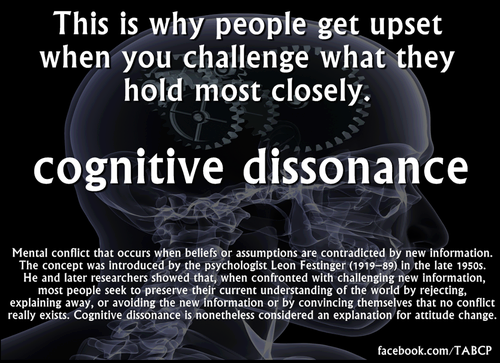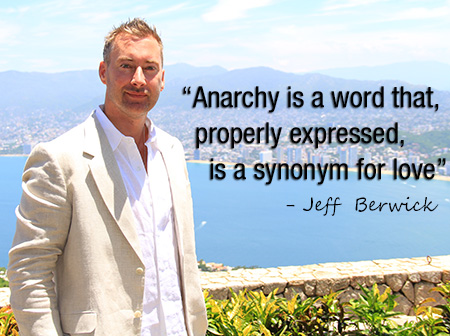You Can't Beat Me Into Anarchy
Anarchism seems to be gaining more and more interest – once you can get past the preconception that it’s nothing more than chaotic insurgence. While still fringe, it’s clearly becoming much more conducive to intelligent conversations about its merit.
For those who have been anarchists for years, it’s become intuitive. You’ve wrestled with what such a life would look like and you strive toward living it personally as well as you can. Then, when you see the statist nonsense for what it is, you understandably experience different reactions. Some are sad, others are disgusted while yet others get downright angry.
Even as I wrote that, I had to reflect on the fact that I could include “understandably.” Just a few years ago, I couldn’t quite understand. It was a bridge I couldn’t seem to cross. Getting here has been a long and arduous journey from being an ardent and passionate patriot. As recently as 9/11, I was flying my stars and stripes proudly.
There was much I had to wrestle with. As I would read one writer, an aspect of my view would be threatened. Then I’d read another and a whole new set of my beliefs was apparently undermined. It wasn’t an avalanche. It was the death of statism by thousands of tiny cuts. But, along the journey, perceived truths would enter into great mental wars with real truths, as I defended what I thought I knew against what was staring me in the face.

Cognitive Dissonance
We all experience cognitive dissonance at times, especially in the things we’re most passionate about. That’s not bad. In fact, it’s good that you experience it, because it alerts you that something isn’t quite right. And we need to be honest – none of us have it all figured out. But what do we do when confronted with this uncomfortable attack on logical fallacies that have nestled in our consciousnesses?
Most people will attempt to explain it away. It’s most comfortable to simply continue on a given path. And sometimes the alternative is so threatening to their current situation that they simply cannot engage with it well. Perhaps it’ll work its way through their thought processes, but often it’ll simply be shut into a corner to wither and die.
There are many who will attempt to reconcile it with their current mindset. Sometimes this is possible simply by shifting our understanding about things. But if it’s truly contradictory, then we either must formulate some sort of systematized rational, though it might not actually be rational, or accept it at face value and deal with it.
Most who will be reading this will probably fall into the latter group. I like to think of myself as this sort of person, though I sometimes encounter cognitive dissonance that I honestly don’t know how to understand. And there have admittedly been topics that I simply considered and accepted as being at odds, knowing that I couldn’t really grasp them clearly.
But, as I noted earlier, often I would find myself searching for greater understanding, only to be met with anger, disgust or derision. Even when reading some articles, the authors would be so vociferous that I wasn’t about to ask questions. I’d just read and try to assimilate what I could, thinking that this particular person would view me as parasitic (which I was, in some ways), part of the problem (which I was, in some ways) and someone who disgusted them (which I very well may have, but that’s their problem).
How could I have been reached most effectively? What would have been more conducive to me being able to think and ask questions? To ponder that, let’s try to put some labels on various types of anarchists.

Anarchy Evangelists
As I mentioned, in my search for what was true and most virtuous I often found myself hampered, held back and confronted with sarcasm and derision. It was true that I didn’t understand. But I was asking honest questions in light of my realization that my paradigm didn’t account for a world without rulers. Unfortunately, it seems that many of my challenges and roadblocks along the way were caused by anarchists.
In order to explore this, I’ve considered that, as with any ideology, there are strains of anarchy. I’m sure they can be broken down almost infinitely, but I’ll concentrate on three main categories.
- The Rogue – This would be the stereotypical statist perspective of an anarchist; you know, the ones who are into violence, insurrection and sometimes even their own form of government. When most statists think of anarchy, this is who they think of. He might be a redneck running moonshine, a religious fanatic striving to weaponize his cult or the supposed Marxist anarchists we see in much of Latin America. These aren’t necessarily anarchists, but it is the anti-state aspect of this group that makes many label them as such.
- The Fundamentalist – This is where it seems that most who are very vocal in their understanding about true anarchy seem to be. They look down on anyone who doesn’t get it, as though they’re idiots. In their own form of elitism, they actually become a detriment to those who are honestly seeking. This group makes it very difficult for those who see anarchism as the stereotypical rogue to consider that there might be a grander perspective.
- The Advocate –This is the person who understands that people are at different stages of their journey, and often need help overcoming preconceptions, indoctrinations and the brainwashing they’ve received all their lives – and continue to be bombarded with through friends, social groups and mainstream media. The Anarchy Advocate shares his views with amazing passion tempered by a winsome and compassionate demeanor that truly understands and empathizes with the plight of the statist.

The Rogue Anarchist
We can dismiss the Rogue Anarchist. I don’t think anyone reading on Steemit will fall into this group. If you do, please consider yourself summarily dismissed.
The Anarchy Fundamentalist
What about the Anarchy Fundamentalist? Alas, they dwell among us. One doesn’t have to go far in the various pro-anarchy sources to find that there is plenty of anarchy fundamentalism to go around.
For my journey, this is the group that held me up the most. It wasn’t my Christian worldview, while there were certain inhibitions. Obviously the statism that had been shoved into my psyche by the statist indoctrination institutions was a challenge. But I was truly trying to understand how anarchy would work – how it could work.
Why do some claim that it’s better? Wouldn’t a limited government make more sense? I was, though I now recognize there’s a certain inconsistency to the terminology, a libertarian minarchist.

A Quick Rabbit Trail
The inconsistency can often be overcome with some defining of terms. While it’s probably true that most minarchists are holding onto a degree of statism, on the other hand, many who label themselves minarchists are actually anarchists who consider their idea of administration to be minanarchy. This gets into a deeper discussion of the distinction between the state and government. We’ll just gloss over it quickly.
For some, there is no distinction. The government is synonymous with the state. Minarchists who embrace this perspective necessarily embrace at least a semblance of statism.
For others, the state and the government can be distinct. In other words, the state is cunning, coercive and wicked, Nock wrote about this distinction in his excellent book, Our Enemy, the State.

The government, on the other hand, simply administrates. While it may be an agent of the state, it may just as well be an agent of the people. These self-proclaimed minarchists may in fact detest the state and see no room for it, but recognize a need for some form of administration, which they consider synonymous with government. With this perspective, they’re really more likely to be anarchists, though still somewhat confused in their terminology.
Back on Track
The Anarchy Fundamentalist is a detriment in attempting to help others understand how evil the state really is. They get angry, offensive and obnoxious about their beloved anarchy, becoming abusive in the process. Often thinking they’re doing the right thing, they are so full of animosity that they fail to recognize that they’ve become a detriment to those they supposedly want to convert.
When this person pops off, those who perceive anarchy as the Rogue version feel justified. Realizing that there is a more virtuous thought process just doesn’t enter their minds. In such cases, anarchy is easily written off as a lunatic ideology that promotes violence against government.

The Anarchy Advocate
I think this person could be summed up in one name, and everyone would get it – Jeffrey Tucker. Nobody I know of seems to exude so much sheer joy in their pursuit and proclamation of all that anarchy has to offer. When Jeffrey speaks, the wondrous beauty of anarchy becomes apparent, as anyone who’s read his Beautiful Anarchy can attest.
As the title to this article states, you can’t beat me into anarchy. It’s like coercing someone into freedom. However, the best course is to love folks into anarchy. Perhaps a list of bullet points will help us think through it.
- · Be humble – You weren’t always an anarchist. Well, there might be a small handful of you that were. But most of you had to rise from some form of statism in order to get to the point where you could embrace anarchy. Even if your parents raised you to be an anarchist, be grateful and not proud, counting your blessings of birth.
- · Be empathetic – Approach folks from a point of understanding. Try to grasp why they think what they do, then ask questions that will help them think about the implications. When they say something you know isn’t right, continue to seek mutual understanding so that they can have the opportunity to grapple with what you’re thinking.
- · Be gentle – The goal should be to win people, not push them away. If we hit them over the head with anarchy, then aren’t we basically being coercive? Now we’re back to cognitive dissonance.
- · Don’t expect everyone to change – It’s just not how we’re generally wired. Those who are, probably are already exploring and seeking outside the status quo. Convincing those who embrace the status quo is very difficult. We need to be willing to lovingly give them bits and pieces and let them cogitate on them for a while. Maybe the thousand tiny cuts will do their work. Maybe not. Can we love them in their plight anyway?
- · Meet them where they are – Everyone is at a different place in their journey. Most will never come to where you are, at least not during your lifetime. We need to learn how to meet them at a place where they are already, attempting to help them forward in their journey. This means that it’s more important that you understand what they think than it is to tell them what you think, at least at first. Besides, the Socratic method of teaching is probably the most effective anyway, so just keep asking the right questions.

Final Thoughts
Some of you who are here fall into both of these last two groups. I’ve seen a couple of you go from fundamentalism to gentle advocacy in the past few years. It’s been inspiring.
Where do you fall? Maybe you’re not an anarchist at all, but can identify with the challenge of even having an intelligent conversation about it. Maybe you’re a fundamentalist that needs to stop getting in the way. Hopefully you’re a true Anarchy Advocate, or are in the process of becoming one, and will continue to lovingly draw people to freedom.
After all, if you’re trying to beat me into anarchy, you’re really no different than the state.

I have moved through all three archetypes, and I sadly sometimes drift from being an advocate to being a fundamentalist again. I do try my best to spread understanding and to be calm, collected, and informative, but the sheer number of people that most all of us have run into on FB, Twitter, and elsewhere whose sole goal of engagement is to discredit anarchy makes it hard to stay true to the message. And you're right, as are Tucker, Berwick, and others. Anarchy is all about love, and in the context of human interaction, is synonymous with love.
You're also right that you can't beat someone over the head with it and expect to get far. It's fun to get into bash wars with trolls, but the danger there is the tendency to take that bashing and apply it to people who, although they may be incredulous at the idea, are open to conversation. Losing the forest for the trees is far too easy to do in debates.
I hear you. I've been both as well, though it's been easier as I get older to just embrace the advocate position and let folks be what they're going to be. At this point, I'll rarely debate unless someone is really engaging well and respectfully. When the sarcasm comes out, or some other form of derision, I might post one more time then just ignore that thread. It's not worth my time. And, honestly, I think we get further with readers when we're willing to walk away rather than let the discussion escalate.
I think a lot of the issues people have with anarchy are due to a false perception (promoted by Big Media) that anarchists promote mayhem & destruction not peace & cooperation. I prefer to use the word voluntaryism myself in order to reach more people... I admire those who are able to hit the issue head on so that more understand what anarchy truly means.
Yeah, that's the "Rogue" position I mention in my outline. And all-too-often even the most peaceful anarchists are portrayed this way by the media.
Voluntaryism certainly works, perhaps better in a lot of cases. I tend to worry less about terms and focus more about ideas. I think this is where meeting them where they are really comes to play. If they want to define the terms, I let them. I might offer an alternative, but my desire is more to help them think than to make sure they're following my definitions. If I can help them think about things differently, then I'm accomplishing the goal.
This is very important. I've had issues with that in the past, being unable to imagine how offputting it is for people when you proclaim that they're violent and advocating for murder etc etc. I'll always have trouble with this, because I have never been a very social or empathic person, but even though that's the case, I still do my best to work towards being more gentle in my speech and advocacy.
Thanks!
I think most of us can lean toward the derisive side. I've only met a handful of people in my life who really seemed to hold no malice at all. It was soo refreshing and convicting at the same time.
If you haven't already, you should check out @sterlinluxan, he's very much like what we might describe as a gentle persuader :)
Pleased to meet you anotherjoe!
i've really come to the conclusion quite lately that i need to be patient and somehow give support and almost empathy in order for these people to open just a crack. i myself can easily get into arguments because i simply enjoy confrontation on the facts. (Chalk it up to my aries rising, lol!!!)
You are entirely right in your points...Now i resolve to be a gentler, kinder and more patient kind of advocate for that which i love and know to be true!!!
Thank you for this post! Following!
What an encouraging response. Thanks!
Thanks for this. The 'if you're not an anarchist you must be pro-murder and pro-rape' thing got old for me quickly.
I know the feeling. That's apparently the exact strategy employed by the statists of the world. Somehow, this false belief has been adopted: that you can use coercion to regulate and deny individual liberties and still call it "defending individual liberty."
I don't know where the breakdown occurs - whether it's with semantics or with concepts - but the proposition is entirely impossible. But I'm pretty sure that those who advocate it actually do understand it, because when you get down to the fundamentals of liberty, I have yet to come across anyone who truly believes that theirs should be arbitrarily violated. They'll hem and haw about consent and they'll collectivize rights that would otherwise not exist, but they never cede that you as an individual has any right whatsoever to violate theirs.
The cognitive dissonance is definitely real when it comes to statism. Once overcome, however, the truth is quite plain to see.
Yes, anarchy has a negative meaning for most people. I think most people here just want freedom from government over reach
I enjoyed this article a lot. You put into plain words what I feel others here have not. I felt like what I was reading was badly belittling statist and demanding you see anarchy their way. Which is off putting.
Looking at the world from a universal perspective I think that some form of government would always be needed. This is because someone out there will eventually rise to power and try to subjugate people. Power and greed are powerful forces. A group of people(army) would need to be there to put these kind of people in check.
Thanks @naifaz
Volumes have gone into describing various ways this could work. No matter what we do, there will be the underhanded aspect that plagues human nature. Somebody will always try to gain advantage, if even by force. You're right. How do we check that? It's an interesting, but certainly worthwhile, dilemma.
This is what it's all about. You seek truth, it knocks you in the face, you deny it and rage against it, and then when all your inner work is done, it becomes clear as day that this is what truth is. It makes logical sense, it feels good, and it is absolutely intuitive.
All of us must pass through, what I call, the great anger stage. And why wouldn't we be angry when we first find out what has been done to our people by governments throughout centuries? In these situations anger is the driving force. If we're not angry, why would we look any further?
Then, once the truth assimilates and we work through our emotions, the anger dissipates and is replaced by understanding and love. I'm just coming out on the other end myself and it looks glorious!
Well put! Thanks.
Until coming to this site, I had no interest in government: I took an AP gov class 15 years ago in high school, but I never thought about it afterwards or wondered what type of ist/ian/can/ic I am. After reading this, I'm on the same page with you and consider myself basically a minarchist. I simply don't see how having no government is clearly a better situation. I understand the counterargument, slippery slopes and what not. But I just don't think pure anarchy is ideal, maybe done gradually it would be, but I am at the moment unconvinced. A parable I've referenced a few times in other blogs which questions problems with anarchy by @biophil: a parable about voluntaryism
I wrote a blog a few days back questioning why anarchy is necessarily better, and concluding that some regulation is positive. I never received any answers telling me otherwise.
I see a lot of parallels in your subdivisions of anarchy to atheism, and wish I had acted like a more compassionate human being to those who believe in the past. In the end we are all on a quest for knowledge, and people are on different stages of their journey.
nice blog, upvoted and followed
Thanks!!
For clarity, anarchy does not necessitate no form of government. It doesn't necessitate no rule or law. It DOES necessitate no rulers. The difference is whether the administrative agent is simply that, or is coercive. As soon as it's coercive, it's overstepped and become the state. So you can still be an anarchist and embrace an idea of some form of administration/governing body. They just can't have authority over the people.
Reams have been written on the practicality of this. There are challenges, but the questions are whether freedom is preferable to coercion and if conditions under the known tyrrany of the state are better than the unknown challenges of an society without rulers.